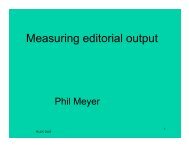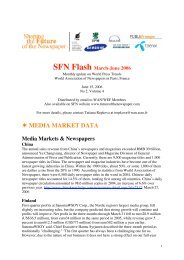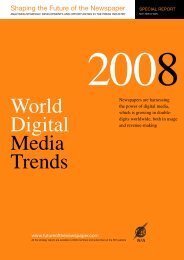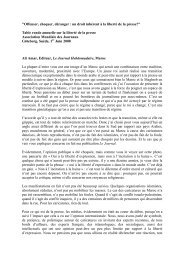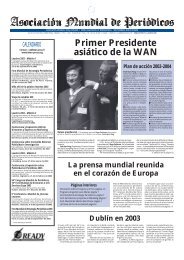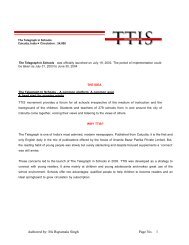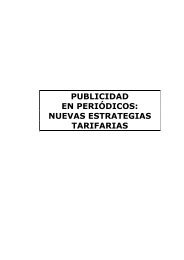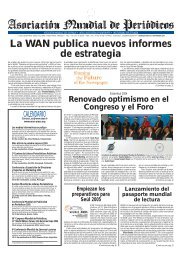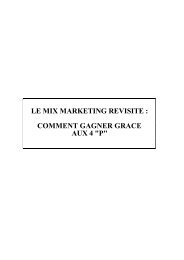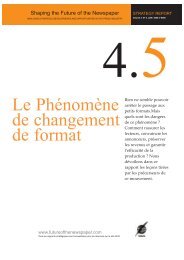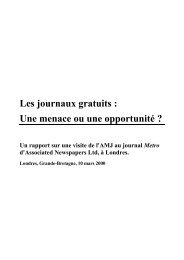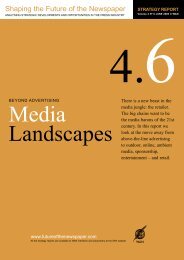WORLD PRESS TRENDS - World Association of Newspapers
WORLD PRESS TRENDS - World Association of Newspapers
WORLD PRESS TRENDS - World Association of Newspapers
You also want an ePaper? Increase the reach of your titles
YUMPU automatically turns print PDFs into web optimized ePapers that Google loves.
Commentary – Verband Österreichischer Zeitungen (VÖZ – Austrian Newspaper <strong>Association</strong>)<br />
The economy. 2002 did not bring the economic recovery so<br />
many were waiting for, but was instead characterised by low<br />
growth: GDP grew only 0.9%, unemployment was 4.1% and<br />
inflation was 1.8%. The advertising market developed equally<br />
modestly. The decline that started in September 2001 continued<br />
in 2002; it has temporarily put an end to the flourishing<br />
development <strong>of</strong> the last twenty years. The Austrian economy<br />
invested Euro 2.0 billion in traditional advertising in 2002. This<br />
was Euro 34.6 million, or 1.7%, less than in 2001. The downturn<br />
seems particularly severe after the boom years <strong>of</strong> 1999 and 2000,<br />
when the ad market enjoyed respective growth rates <strong>of</strong> 15%<br />
and 9%. These figures include advertising in daily newspapers,<br />
weekly papers, magazines, trade journals, television, radio,<br />
outdoor and brochures; they are measured at ratecard prices<br />
and exclude discounts and taxes. Note that the advertising<br />
expenditure figures at the end <strong>of</strong> this entry do not include<br />
brochures.<br />
The same trend is also evident in the advertising market’s share<br />
<strong>of</strong> gross domestic product. Ad expenditure accounted for only<br />
0.94% <strong>of</strong> GDP in 2002, compared with 0.98% in the two<br />
preceding years (again, at ratecard prices and including<br />
brochures). Per capita advertising expenditure declined from a<br />
peak <strong>of</strong> Euro 232 in 2000 to Euro 228 in 2002.<br />
Print clearly remained the strongest advertising medium in 2002,<br />
attracting Euro 1.11 billion in ad expenditure. Nevertheless,<br />
print had a difficult year, losing almost Euro 35 million, or 3%,<br />
<strong>of</strong> the previous year’s ad expenditure. Print accounted for 55.4%<br />
<strong>of</strong> the advertising market in 2002 – a drop <strong>of</strong> 0.7 percentage<br />
points over 2001, thus eliminating the gains in market share it<br />
won in the boom year <strong>of</strong> 2000. Daily newspapers and their<br />
supplements are traditionally the strongest components <strong>of</strong> print<br />
advertising, but they suffered the biggest decline in 2002. Daily<br />
newspapers earned advertising revenues <strong>of</strong> Euro 537 million –<br />
5.9% less than in 2001 – and accounted for 26.7% <strong>of</strong> the<br />
advertising market. In 2002, daily newspapers published 32,500<br />
pages <strong>of</strong> advertising as compared with almost 36,000 in the<br />
preceding year.<br />
As in 2001, capital goods remained the leading advertising<br />
sector, despite cutting their advertising expenditure by almost<br />
7%. With budgets <strong>of</strong> Euro 663 million, capital goods still account<br />
for almost one-third <strong>of</strong> the Austrian advertising market. They<br />
are followed by brand name articles, with advertising<br />
expenditure <strong>of</strong> Euro 433 million and then by the services sector,<br />
trade, media and others. (All ad expenditure data is from Media<br />
Focus Research).<br />
AUSTRIA<br />
television (ORF) in keeping with its character as a public<br />
institution. Above all, the <strong>Association</strong> has demanded immediate<br />
abolition <strong>of</strong> the 5% tax on advertising, as well as equal<br />
opportunities for newspaper delivery: due to its monopoly<br />
position, only the completely state-owned postal service has<br />
access to letterboxes in apartment houses and large apartment<br />
blocks at present. In addition, the <strong>Association</strong> confirmed its<br />
commitment to press subsidies as an indispensable instrument<br />
for maintaining and assuring newspaper diversity. Without<br />
press subsidies, one-third <strong>of</strong> the daily newspapers would<br />
currently face the threat <strong>of</strong> closure.<br />
Although the coalition’s media policy projects are worded fairly<br />
vaguely in the new government programme, they have taken<br />
into account some <strong>of</strong> the <strong>Association</strong>’s demands, particularly<br />
the demands to abolish the tax on advertising, implement the<br />
EU Directive on copyright, and establish clear rules for<br />
advertising and sponsoring in public and private broadcasting.<br />
The government is preparing to evaluate press subsidies, with<br />
a focus on promoting quality and maintaining regional diversity.<br />
In 2002, 16 daily newspapers received a total <strong>of</strong> Euro 3.81 million<br />
in press subsidies from Federal funds, six daily newspapers with<br />
lower advertising volumes additionally received special press<br />
subsidies totalling Euro 7.59 million, and 45 weekly papers<br />
received a total <strong>of</strong> Euro 1.99 million.<br />
Publishing houses continued their efforts to reduce costs in 2002<br />
as the basic economic conditions remained difficult. They paid<br />
particular attention to reducing operating costs, spending less<br />
on diversification, exploring the potential for cooperation, and<br />
looking after their core brands. Circulation and readership<br />
numbers remained generally stable.<br />
Distribution is important. Less than 20% <strong>of</strong> the 1.3 million<br />
newspapers delivered to subscribers every day are now<br />
delivered by the postal service. Private door-to-door delivery<br />
has been successively increased in recent years to boost<br />
efficiency and customer-friendliness, and more publishers are<br />
forming delivery partnerships, which <strong>of</strong>fer clear efficiency<br />
savings. To develop much further, though, private delivery<br />
services need access to indoor letterboxes in apartment blocks,<br />
which, as we noted previously, are barred to them at the<br />
moment. In addition to the distribution companies and<br />
partnerships set up by the publishing houses, Styria Medien<br />
and the TNT Post Group have set up a company called redmail<br />
Logistik & Zustellservice GmbH, which currently employs 3,900<br />
delivery staff.<br />
Media policy. New developments in media policy were delayed<br />
when the Austrian government stepped down in September<br />
2002 and the Nationalrat (parliament) was dissolved<br />
prematurely. This delayed the implementation <strong>of</strong> the EU<br />
Directive on copyright, and the government’s planned reform<br />
<strong>of</strong> state press subsidies. Following the parliamentary elections<br />
on 24 November 2002, the Austrian People’s Party (ÖVP) and<br />
the Austrian Free Democratic Party (FPÖ) finally established a<br />
coalition government in early February 2003.<br />
During the coalition negotiations in January 2003, the Austrian<br />
Newspaper <strong>Association</strong> (VÖZ) presented a catalogue <strong>of</strong><br />
demands concerning future media policy. The objective behind<br />
these demands was to safeguard Austria as location for media,<br />
ensure up-to-date regulation <strong>of</strong> competition, expand freedom<br />
<strong>of</strong> information and regulate advertising on Austrian public<br />
Six daily newspapers and three large online portals have set up<br />
a ‘supraregional’ portal called www.derMarkt.at as a common<br />
platform for online and print classified advertising. The portal<br />
has been online since August 2002 and covers three subject<br />
headings: jobs, property, and motor vehicles.<br />
Three publishing houses published their daily newspaper titles<br />
as electronic newspapers last year.<br />
Other activities. In autumn <strong>of</strong> 2002, the <strong>Association</strong> launched<br />
a major joint campaign for print advertising with the motto ‘Print<br />
bringt’s’ (‘Print does its job). The campaign was designed to<br />
present the entire spectrum <strong>of</strong> newspaper advertising both<br />
attractively and emotionally under 15 subjects, and aimed not<br />
just to defend print’s share <strong>of</strong> the advertising market but to<br />
increase it. This campaign continues in 2003.<br />
<strong>WORLD</strong> ASSOCIATION OF NEWSPAPERS - <strong>WORLD</strong> <strong>PRESS</strong> <strong>TRENDS</strong> 2003 53



